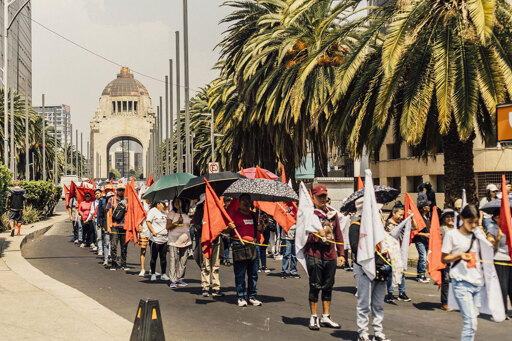This editorial by Colectivo del Periódico El Zenzontle originally appeared in the November 8, 2025 issue of La Jornada de Oriente, the Puebla edition of La Jornada*, Mexico’s premier left wing daily newspaper. The views expressed in this article are the author’s own and do not necessarily reflect those of* Mexico Solidarity Media*, or the Mexico Solidarity Project.*
Nearly 6 out of 10 workers in Mexico are in the informal sector. With monthly and seasonal variations, the informal employment rate was 54.9 percent in September, almost the same as in the same month of 2014. But among those employed, it is observed that women swell the ranks of the precariously employed outside of stable and formal jobs.
However, men are already hearing the warning to take heed: everyone involved in the automotive sector (assembly plants, high-tech plants, and small and medium-sized auto parts companies) is living in uncertainty due to the combination of two factors that threaten employment: the closure of plants like General Motors and Nissan, which are relocating either to the United States or to the border with that country, also due to the reduction in the market for some of their products, given the tariffs imposed by the Donald Trump administration, and because the transnational parent companies state: they will move forward “in the international restructuring process that seeks to transform their operations in response to technological challenges and the global economic environment.”
The closure of companies, staff reductions, the intensification of work and the lengthening or rotation of workdays, as well as the management of time with temporary production stoppages that affect workers’ wages is both on the horizon and present already.
All of this indicates that in the face of uncertainty, organized vigilance and the preparation of forces with the capacity to negotiate with their international employers will be essential. To fail to do so would be to resign oneself to whatever comes, to accept whatever bureaucratic leaders and corrupt labor advisors agree upon with the companies. It would mean thinking more about the amount of one’s severance pay than about preserving employment through resistance.
The same is happening in the education, health, and government sectors as a whole. The ongoing reforms of the 4-T government emphasize flattening contractual wages toward the minimum wage, one or two times the minimum wage on average, which increases in pesos, but leaves workers at the bottom of what they earned in their contracts.
At the same time, the digitization of processes is being implemented with two repercussions: there will be work overloads for programs where algorithms and artificial intelligence reduce staff and expand coverage, sometimes without rhyme or reason, so that users can “universalize” and expedite their care at health institutions, with a narrower range of medications. Meanwhile, students are being served online and given more computer-based assignments for their teachers’ reports (many of whom are hired per subject). Public service administrators, as is already happening in banking and financial services, are being forced to adapt to the digital pace. Finally, “welfare” projects are being expanded as if they were unpaid employees with a service-oriented face, more “interns,” “volunteer servants,” “enslaved servants of the nation,” outsourced workers, and other forms of overexploitation and labor discrimination.
Despite these calamities, the struggles of the working class continue: the experienced and attentive inform themselves and organize in their factory areas and service centers without placing their trust in the union leadership, which is mostly sold out or subservient to the logic of capital.
But although this economically conscious sector is growing, its connection with other movements of the same type is insufficient, and even less so with those in their immediate surroundings, their neighborhood, their community. Only a minority has international solidarity links with other workers.
It is time to prepare and organize strength in every center and community. To think about the class and not just the trade, and even less about their specific category.
The working class in these times has no option to emigrate. Trump and global capital close the borders to them and persecute them. There is no evidence that the government will recover the social security, pensions, and dignified retirement benefits that were expropriated. There are no charismatic figures or presidential fairies to defend them.
It is time to do what only workers can do: prepare, identify the common enemy, and defend themselves by organizing as a class in a continuous struggle until victory.
Class Resistance Against Uncertainty & Resignation
November 9, 2025
It is time to prepare and organize strength in every center and community. To think about the class and not just the trade. The working class in these times has no option to emigrate.
Mexico’s Ban on Outsourcing Revealed Massive Profit-Sharing Evasion
November 8, 2025
For years, corporations in Mexico used outsourcing to evade financial obligations to workers, pocketing tens of billions, until a 2021 outsourcing ban closed their lucrative, exploitative loophole.
Six Structural Barriers Hinder Gender Equality in Mexican Workplaces
November 5, 2025
Equality is not a concession or a favor, it is an act of justice. As long as women’s work remains invisible, there will be no economic justice.
The post Class Resistance Against Uncertainty & Resignation appeared first on Mexico Solidarity Media.
From Mexico Solidarity Media via this RSS feed





